Reflection on Leadership and Communication Skills in Management
VerifiedAdded on 2023/04/07
|5
|858
|437
Report
AI Summary
This report presents a four-part reflection on the author's communication and leadership experiences. It explores the importance of verbal and non-verbal communication in psychology and management, emphasizing the impact of effective communication on achieving goals. The author reflects on their personal and professional development, discussing strategies to enhance communication skills, identify strengths and weaknesses, and adapt to different communication styles. The reflection highlights the author's extroverted nature, proactive approach, and interactive skills, while also acknowledging potential challenges. The report concludes with a discussion of the importance of continuous self-assessment and improvement in communication for both personal and professional success, emphasizing the development of strategies to enhance communication skills and improve the chances of success.
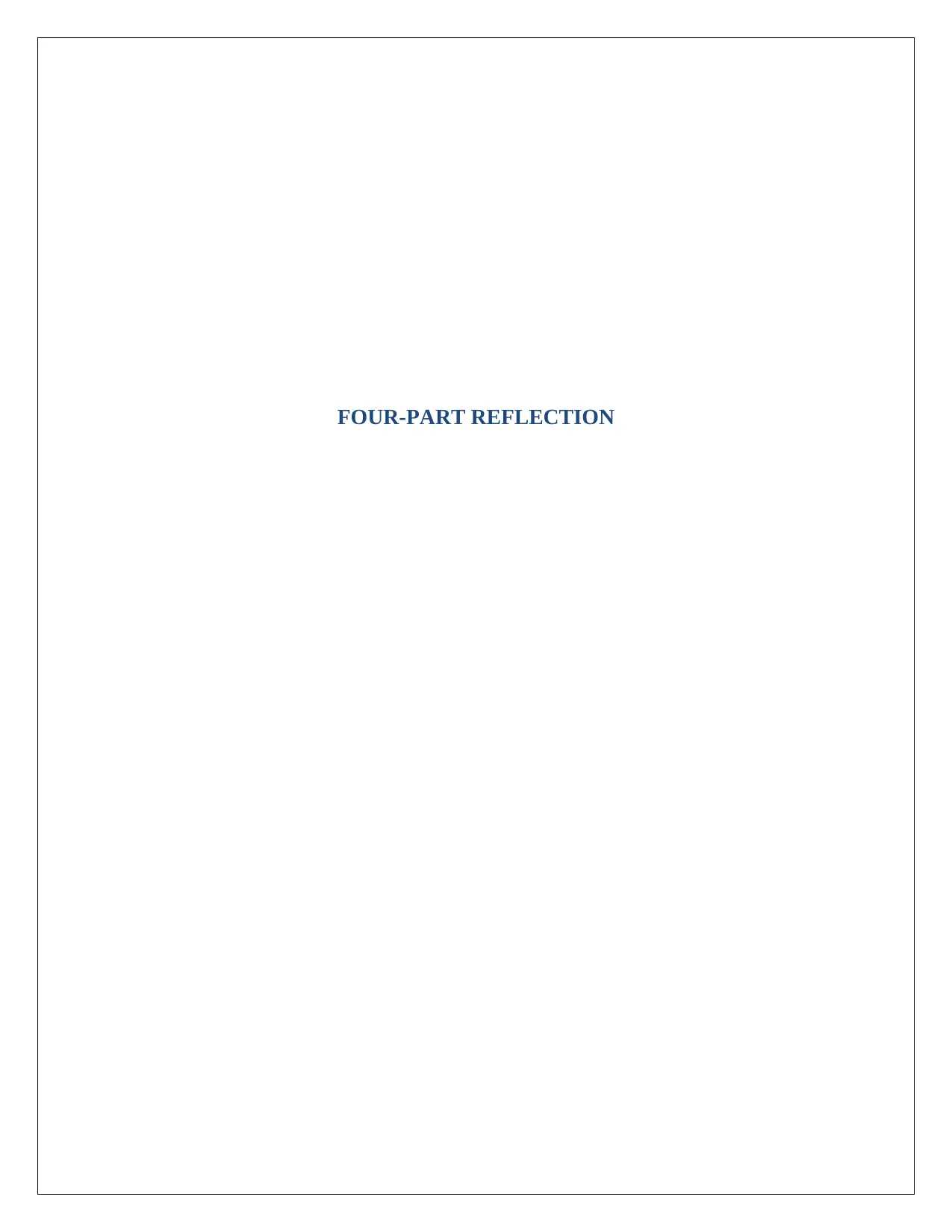
FOUR-PART REFLECTION
Paraphrase This Document
Need a fresh take? Get an instant paraphrase of this document with our AI Paraphraser
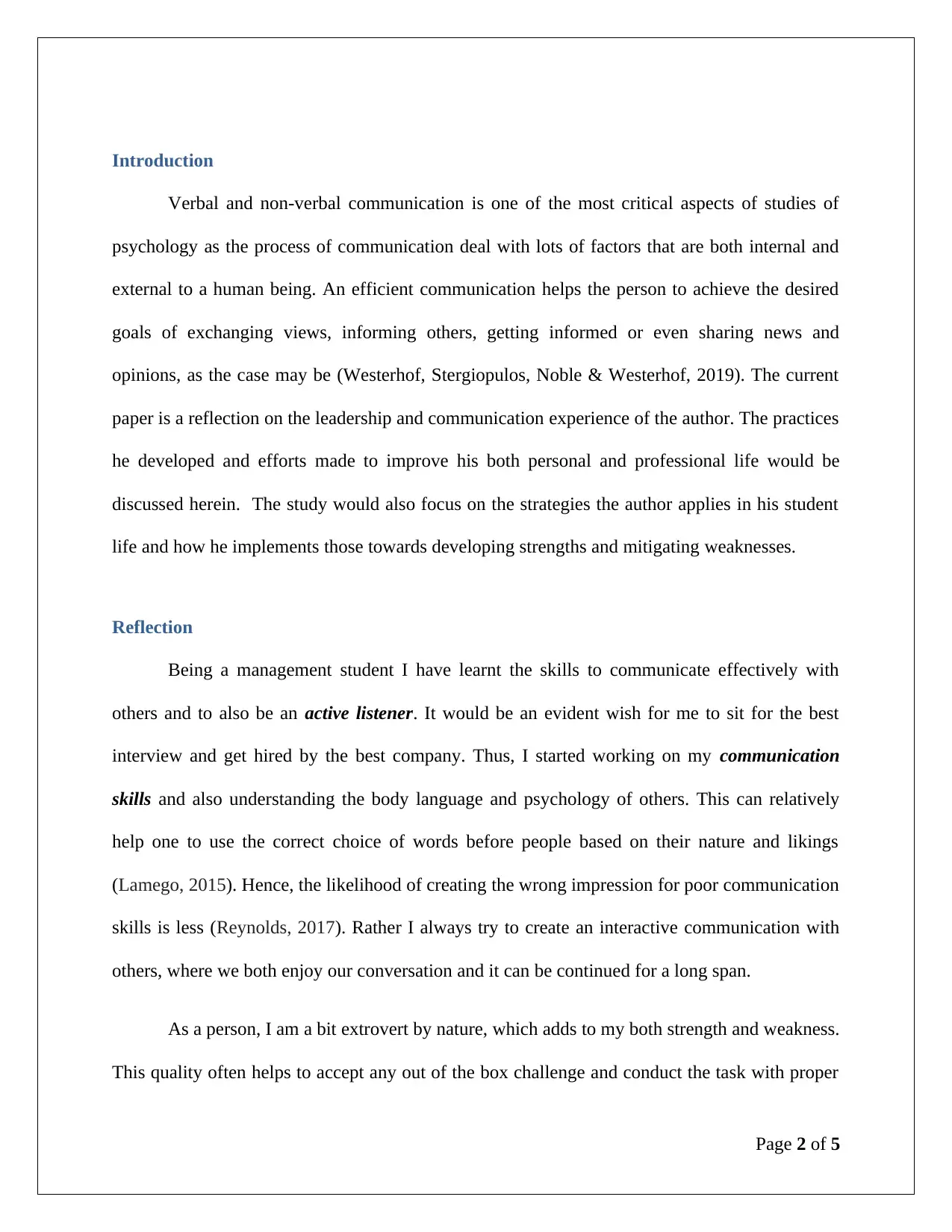
Introduction
Verbal and non-verbal communication is one of the most critical aspects of studies of
psychology as the process of communication deal with lots of factors that are both internal and
external to a human being. An efficient communication helps the person to achieve the desired
goals of exchanging views, informing others, getting informed or even sharing news and
opinions, as the case may be (Westerhof, Stergiopulos, Noble & Westerhof, 2019). The current
paper is a reflection on the leadership and communication experience of the author. The practices
he developed and efforts made to improve his both personal and professional life would be
discussed herein. The study would also focus on the strategies the author applies in his student
life and how he implements those towards developing strengths and mitigating weaknesses.
Reflection
Being a management student I have learnt the skills to communicate effectively with
others and to also be an active listener. It would be an evident wish for me to sit for the best
interview and get hired by the best company. Thus, I started working on my communication
skills and also understanding the body language and psychology of others. This can relatively
help one to use the correct choice of words before people based on their nature and likings
(Lamego, 2015). Hence, the likelihood of creating the wrong impression for poor communication
skills is less (Reynolds, 2017). Rather I always try to create an interactive communication with
others, where we both enjoy our conversation and it can be continued for a long span.
As a person, I am a bit extrovert by nature, which adds to my both strength and weakness.
This quality often helps to accept any out of the box challenge and conduct the task with proper
Page 2 of 5
Verbal and non-verbal communication is one of the most critical aspects of studies of
psychology as the process of communication deal with lots of factors that are both internal and
external to a human being. An efficient communication helps the person to achieve the desired
goals of exchanging views, informing others, getting informed or even sharing news and
opinions, as the case may be (Westerhof, Stergiopulos, Noble & Westerhof, 2019). The current
paper is a reflection on the leadership and communication experience of the author. The practices
he developed and efforts made to improve his both personal and professional life would be
discussed herein. The study would also focus on the strategies the author applies in his student
life and how he implements those towards developing strengths and mitigating weaknesses.
Reflection
Being a management student I have learnt the skills to communicate effectively with
others and to also be an active listener. It would be an evident wish for me to sit for the best
interview and get hired by the best company. Thus, I started working on my communication
skills and also understanding the body language and psychology of others. This can relatively
help one to use the correct choice of words before people based on their nature and likings
(Lamego, 2015). Hence, the likelihood of creating the wrong impression for poor communication
skills is less (Reynolds, 2017). Rather I always try to create an interactive communication with
others, where we both enjoy our conversation and it can be continued for a long span.
As a person, I am a bit extrovert by nature, which adds to my both strength and weakness.
This quality often helps to accept any out of the box challenge and conduct the task with proper
Page 2 of 5
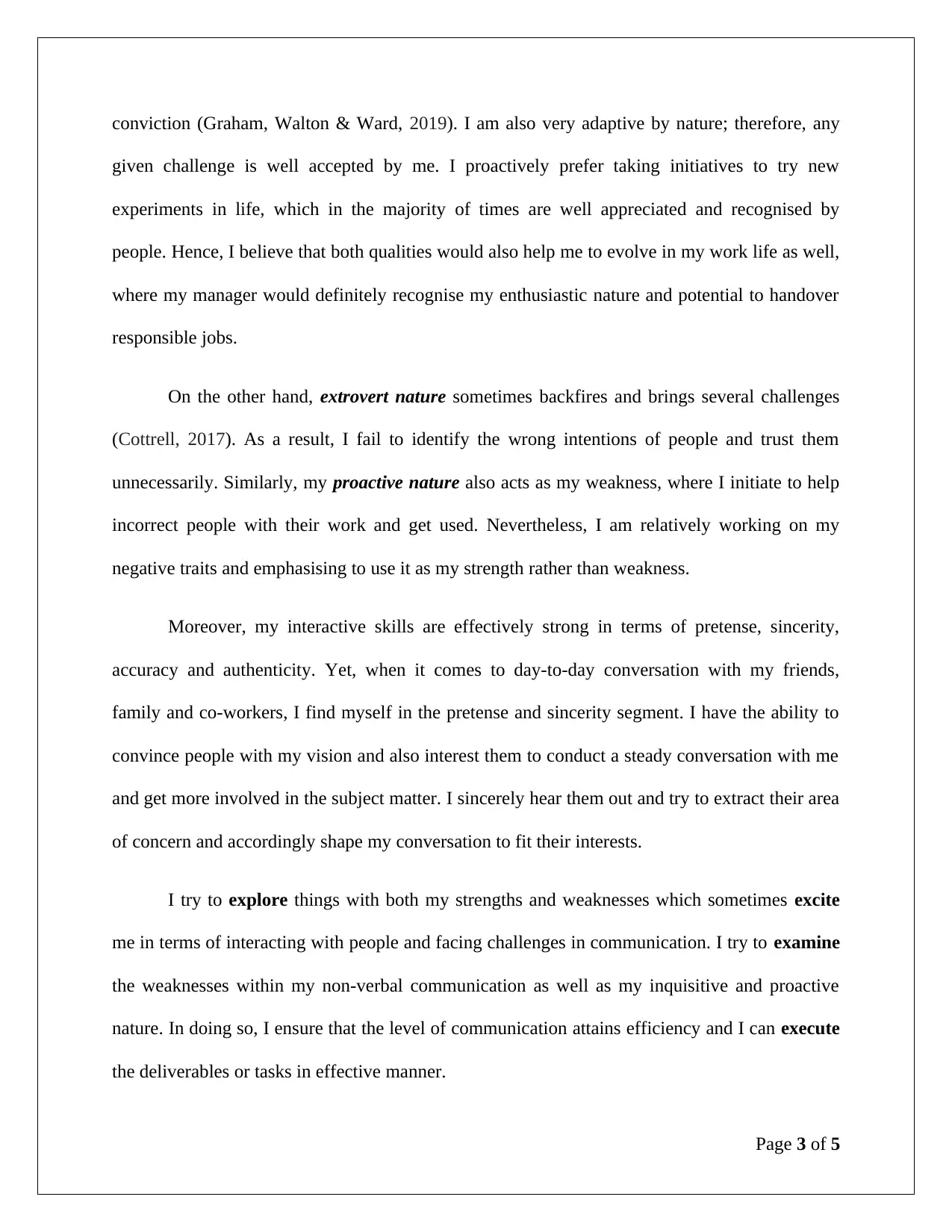
conviction (Graham, Walton & Ward, 2019). I am also very adaptive by nature; therefore, any
given challenge is well accepted by me. I proactively prefer taking initiatives to try new
experiments in life, which in the majority of times are well appreciated and recognised by
people. Hence, I believe that both qualities would also help me to evolve in my work life as well,
where my manager would definitely recognise my enthusiastic nature and potential to handover
responsible jobs.
On the other hand, extrovert nature sometimes backfires and brings several challenges
(Cottrell, 2017). As a result, I fail to identify the wrong intentions of people and trust them
unnecessarily. Similarly, my proactive nature also acts as my weakness, where I initiate to help
incorrect people with their work and get used. Nevertheless, I am relatively working on my
negative traits and emphasising to use it as my strength rather than weakness.
Moreover, my interactive skills are effectively strong in terms of pretense, sincerity,
accuracy and authenticity. Yet, when it comes to day-to-day conversation with my friends,
family and co-workers, I find myself in the pretense and sincerity segment. I have the ability to
convince people with my vision and also interest them to conduct a steady conversation with me
and get more involved in the subject matter. I sincerely hear them out and try to extract their area
of concern and accordingly shape my conversation to fit their interests.
I try to explore things with both my strengths and weaknesses which sometimes excite
me in terms of interacting with people and facing challenges in communication. I try to examine
the weaknesses within my non-verbal communication as well as my inquisitive and proactive
nature. In doing so, I ensure that the level of communication attains efficiency and I can execute
the deliverables or tasks in effective manner.
Page 3 of 5
given challenge is well accepted by me. I proactively prefer taking initiatives to try new
experiments in life, which in the majority of times are well appreciated and recognised by
people. Hence, I believe that both qualities would also help me to evolve in my work life as well,
where my manager would definitely recognise my enthusiastic nature and potential to handover
responsible jobs.
On the other hand, extrovert nature sometimes backfires and brings several challenges
(Cottrell, 2017). As a result, I fail to identify the wrong intentions of people and trust them
unnecessarily. Similarly, my proactive nature also acts as my weakness, where I initiate to help
incorrect people with their work and get used. Nevertheless, I am relatively working on my
negative traits and emphasising to use it as my strength rather than weakness.
Moreover, my interactive skills are effectively strong in terms of pretense, sincerity,
accuracy and authenticity. Yet, when it comes to day-to-day conversation with my friends,
family and co-workers, I find myself in the pretense and sincerity segment. I have the ability to
convince people with my vision and also interest them to conduct a steady conversation with me
and get more involved in the subject matter. I sincerely hear them out and try to extract their area
of concern and accordingly shape my conversation to fit their interests.
I try to explore things with both my strengths and weaknesses which sometimes excite
me in terms of interacting with people and facing challenges in communication. I try to examine
the weaknesses within my non-verbal communication as well as my inquisitive and proactive
nature. In doing so, I ensure that the level of communication attains efficiency and I can execute
the deliverables or tasks in effective manner.
Page 3 of 5
⊘ This is a preview!⊘
Do you want full access?
Subscribe today to unlock all pages.

Trusted by 1+ million students worldwide
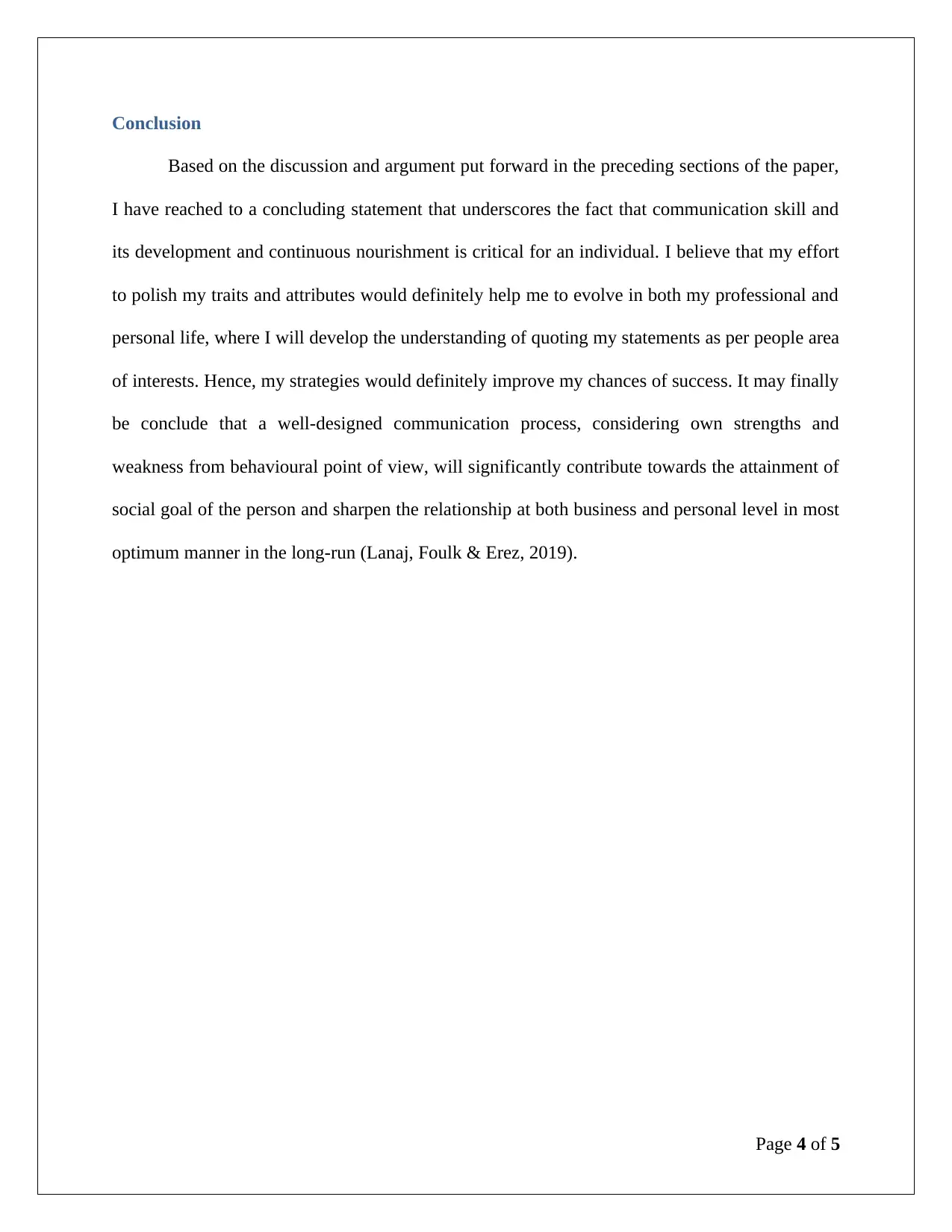
Conclusion
Based on the discussion and argument put forward in the preceding sections of the paper,
I have reached to a concluding statement that underscores the fact that communication skill and
its development and continuous nourishment is critical for an individual. I believe that my effort
to polish my traits and attributes would definitely help me to evolve in both my professional and
personal life, where I will develop the understanding of quoting my statements as per people area
of interests. Hence, my strategies would definitely improve my chances of success. It may finally
be conclude that a well-designed communication process, considering own strengths and
weakness from behavioural point of view, will significantly contribute towards the attainment of
social goal of the person and sharpen the relationship at both business and personal level in most
optimum manner in the long-run (Lanaj, Foulk & Erez, 2019).
Page 4 of 5
Based on the discussion and argument put forward in the preceding sections of the paper,
I have reached to a concluding statement that underscores the fact that communication skill and
its development and continuous nourishment is critical for an individual. I believe that my effort
to polish my traits and attributes would definitely help me to evolve in both my professional and
personal life, where I will develop the understanding of quoting my statements as per people area
of interests. Hence, my strategies would definitely improve my chances of success. It may finally
be conclude that a well-designed communication process, considering own strengths and
weakness from behavioural point of view, will significantly contribute towards the attainment of
social goal of the person and sharpen the relationship at both business and personal level in most
optimum manner in the long-run (Lanaj, Foulk & Erez, 2019).
Page 4 of 5
Paraphrase This Document
Need a fresh take? Get an instant paraphrase of this document with our AI Paraphraser
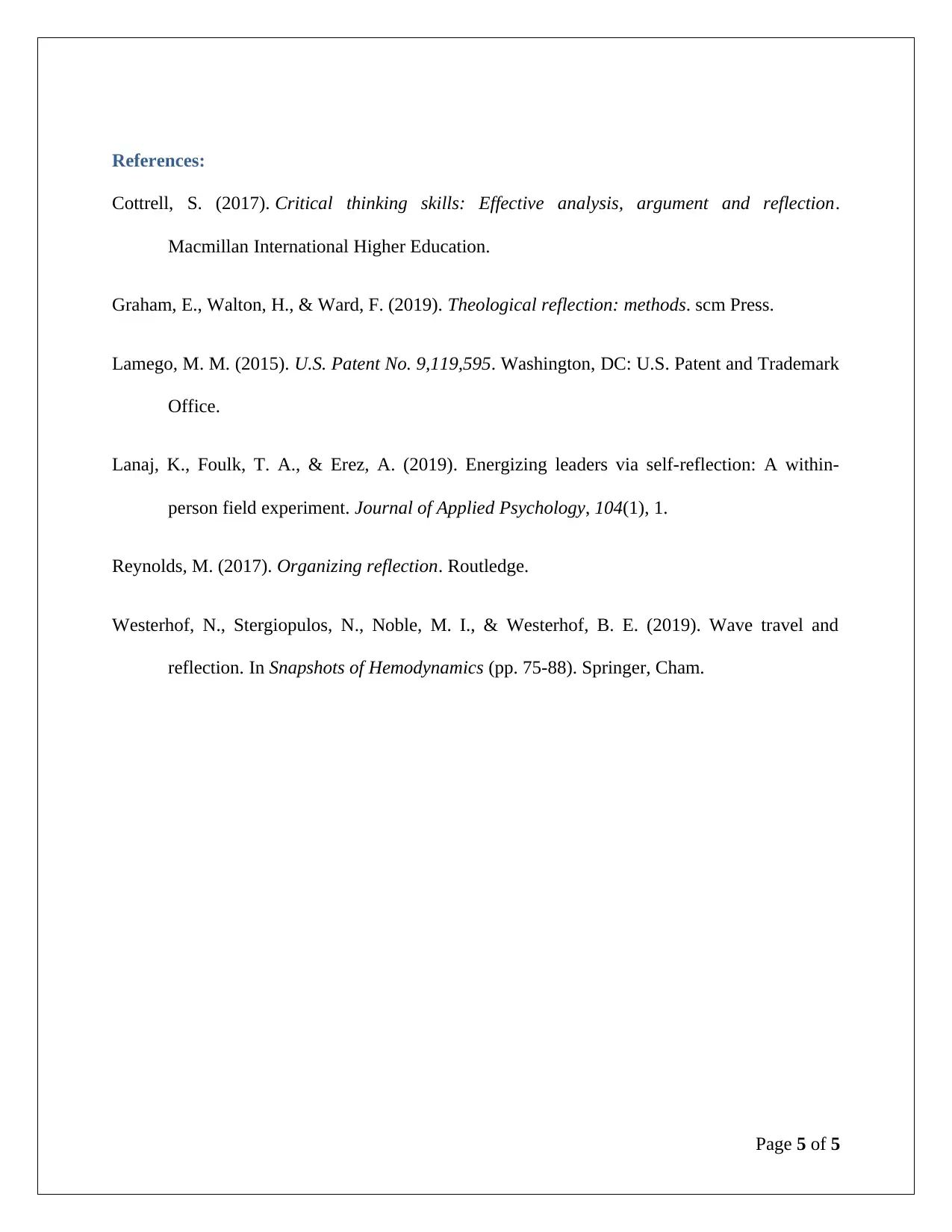
References:
Cottrell, S. (2017). Critical thinking skills: Effective analysis, argument and reflection.
Macmillan International Higher Education.
Graham, E., Walton, H., & Ward, F. (2019). Theological reflection: methods. scm Press.
Lamego, M. M. (2015). U.S. Patent No. 9,119,595. Washington, DC: U.S. Patent and Trademark
Office.
Lanaj, K., Foulk, T. A., & Erez, A. (2019). Energizing leaders via self-reflection: A within-
person field experiment. Journal of Applied Psychology, 104(1), 1.
Reynolds, M. (2017). Organizing reflection. Routledge.
Westerhof, N., Stergiopulos, N., Noble, M. I., & Westerhof, B. E. (2019). Wave travel and
reflection. In Snapshots of Hemodynamics (pp. 75-88). Springer, Cham.
Page 5 of 5
Cottrell, S. (2017). Critical thinking skills: Effective analysis, argument and reflection.
Macmillan International Higher Education.
Graham, E., Walton, H., & Ward, F. (2019). Theological reflection: methods. scm Press.
Lamego, M. M. (2015). U.S. Patent No. 9,119,595. Washington, DC: U.S. Patent and Trademark
Office.
Lanaj, K., Foulk, T. A., & Erez, A. (2019). Energizing leaders via self-reflection: A within-
person field experiment. Journal of Applied Psychology, 104(1), 1.
Reynolds, M. (2017). Organizing reflection. Routledge.
Westerhof, N., Stergiopulos, N., Noble, M. I., & Westerhof, B. E. (2019). Wave travel and
reflection. In Snapshots of Hemodynamics (pp. 75-88). Springer, Cham.
Page 5 of 5
1 out of 5
Related Documents
Your All-in-One AI-Powered Toolkit for Academic Success.
+13062052269
info@desklib.com
Available 24*7 on WhatsApp / Email
![[object Object]](/_next/static/media/star-bottom.7253800d.svg)
Unlock your academic potential
Copyright © 2020–2025 A2Z Services. All Rights Reserved. Developed and managed by ZUCOL.




